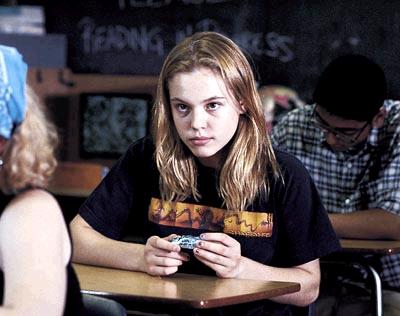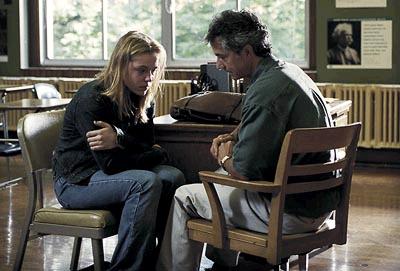

Blue Car, the debut of writer/director Karen Moncrieff, reassures people everywhere that someone can make a movie about a teenager without succumbing to popular culture, which so often turns movies about teenagers into junk. Blue Car is the emotional antithesis of most of these films. It is an accurate portrayal of a teenager on a path to nowhere, extremely bleak and full of despair. It's also a great breakout performance for Agnes Bruckner (Murder by Numbers, The Glass House), who, up to this point only had smaller roles in movies and television. Bruckner is Meg, a high schooler lost in the woes of adolescence. Meg lives with her mother and sister. Her mother (Margaret Colin, Unfaithful, The Adventures of Sebastian Cole) is going from job to job and going to school at night, so she is never around. When she is, things are tense. Resultingly, she needs to take car of her sister Lily (Regan Arnold), who has problems that are out of Meg's power to control. Lily refuses to eat and cuts herself.
It's not a stretch to say that life isn't great for Meg. Her tenuous situation at home makes things at school worse. She has few friends to help her weather these problems. This changes when her teacher, Mr. Auster (David Strathairn, Harrison's Flowers, A Map of the World) encourages her to enter a poetry contest. Meg's only form of solace is poetry, and she releases her pent-up emotions in a poem entitled Blue Car. As a child, her father left her family, and the last vivid memory she has of this event is him driving off in his blue car. The car becomes a powerful symbol in her life, representing everything she could have had. Unlike her mother, Auster encourages her to write. He believes that Meg is still holding back, and that her poem can be darker and more personal. Auster volunteers to help her during lunch to prepare her for the contest. If she wins, she can go on a trip to Miami to compete in the next round.
She does win the first round, which works wonders with her self-esteem. Now, her big problem is getting her mother's permission to go to Miami, and finding the money for a ticket. This is also where Blue Car takes an emotional turn. The crux of the movie is the relationship between Auster and Meg. Initially, they are teacher and student, however it is obvious that Auster has deeper feelings for her. Of course, these cannot be acted upon. Meg sees Auster as a teacher, a friend, and the missing paternal influence in her life. She begins to dress up and wear make-up for him. Meg is not clear how she feels about Auster, whether she admires him as a father figure or has a crush on him. It's probably a little of both, a dangerous combination that comes to a head in once she arrives in Miami. Strathairn has a marvelous screen presence. He always seems very laid back, yet commands authority. Moncrieff uses him differently than most other directors by casting him in more of an ambiguous light. Auster has good qualities, but comes off as very sleazy. Bruckner's Meg is core of the film, and she ably carries the film with a varied performance. She goes through all the ups and downs of a troubled teenager deftly, giving an extremely strong performance. Blue Car does suffer at times from slow pacing, but Bruckner's performance more than makes up for it.